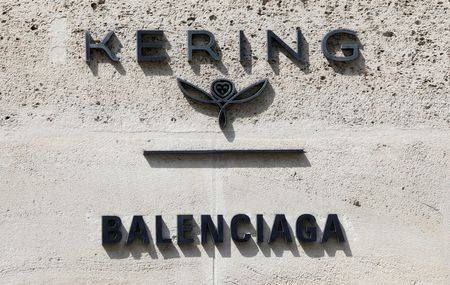 1
1 1
1

By Mimosa Spencer and Silvia Aloisi
PARIS (Reuters) – Gucci owner Kering said on Thursday it was on the hunt for possible acquisitions and might expand in more U.S. cities, after a sales surge showed resilience in demand for luxury goods even as inflation soars.
The luxury industry has fast recovered from the fallout of the coronavirus pandemic, with sales for most groups now exceeding their pre-crisis levels, and thanks to strong demand has room to further increase prices in the face of rising costs.
Sales at Kering – whose brands also include Yves Saint Laurent, Bottega Veneta and Balenciaga – jumped by nearly a third in the last three months of 2021 to 5.41 billion euros ($6.14 billion), powered by a surge of the same magnitude at Gucci that was almost double a 17% average analyst forecast.
The strong comeback by Gucci after a disappointing third quarter is a big relief for Kering – the label accounts for 60% of its revenue and around 70% of its profit. The group also said recurring operating income rose 60% last year, to a record high of just over 5 billion euros, helping send its shares 7% higher by 1400 GMT.
After cutting advertising as the pandemic struck in 2020, Kering increased marketing spending to boost its star brand in 2021 and this paid off particularly in the final part of the year, with the arrival of the new Aria collection in stores.
A broader offer and a sharper focus on high-end fashion and accessories – executives said the average sale price for Gucci had increased substantially – were behind the revenue surge, with U.S. and Chinese growth driving sales.
The release in November of Ridley Scott’s film “House of Gucci”, although not directly linked to the brand, also helped increase the visibility of its designs.
Kering Chairman and CEO Francois-Henri Pinault said Gucci, which enjoyed stellar growth in 2015-2019 but has since been under market scrutiny as its momentum slowed down, had started 2022 in line with the solid trend seen at the end of 2021.
The group’s other brands also did well. Yves Saint Laurent, its second-largest label, saw fourth quarter revenue rocket 47%.
Pinault gave his strongest indication yet that Kering, which had a free cash flow of nearly 4 billion euros in 2021 and almost zero debt, may soon embark on a takeover.
“For sure, acquisitions could make sense in the near future for the group,” he said.
He added that he didn’t see Kering expanding into hospitality, but that jewellery was an area with high potential, possibly through acquisitions.
Fuelled by its reliance on Gucci, speculation has swirled that Kering might contemplate major purchases to diversify its portfolio – especially as larger rival LVMH last year expanded with its $15.8 billion purchase of U.S. jeweller Tiffany.
With the U.S. luxury market booming, Pinault said Kering was considering expanding its store network in second- and third-tier cities such as Atlanta, Charlotte, Nashville and Austin.
“We are revisiting our geographic coverage of stores to cover these zones that are new for us,” he said, adding that new stores include a Gucci store in Austin, Texas.
Kering’s finance chief Jean-Marc Duplaix said Gucci – which increased prices twice in 2020 and in 2021 – would again raise prices in a “targeted manner” this year, and flagged price increases for the group’s other labels too.
The group’s shares have gained 28% in the past year and Duplaix said that despite higher raw material and transport costs, the group was confident it could keep improving its profitability. Rival Louis Vuitton lifted prices this week to protect margins.
($1 = 0.8807 euros)
(Reporting by Mimosa Spencer and Silvia Aloisi; Editing by Kenneth Maxwell and Susan Fenton)